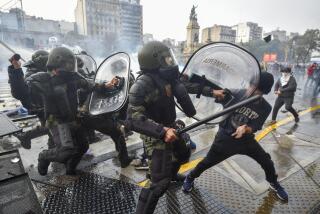Argentine Parties Still Divided on Transition Accord
- Share via
BUENOS AIRES — Argentina’s two main political parties stumbled toward deadlock Monday on efforts to shorten the presidential transition and to forge an emergency economic program to rein in inflation of more than 8,000%.
Leaders of the ruling Radical Civic Union threatened to refuse to move up the inauguration of Peronist party President-elect Carlos Saul Menem unless he agreed to support the emergency economic measures.
Without such an accord, they said, President Raul Alfonsin will serve out his term until its scheduled conclusion Dec. 10, reversing his agreement Sunday night to a speedy transition to help restore economic order.
Menem, however, refused to endorse the Radicals’ economic package, which he said involves “higher public service charges, higher taxes and other measures that we have been rejecting consistently.” He demanded salary increases for laborers and more aid for the near-bankrupt provincial governments as key to any plan.
“Nothing is resolved in terms of the transition, and there is no pressure on the part of Justicialism (Peronism) for the early handover of the government,” he said after a meeting with fellow provincial governors.
Menem, governor of La Rioja province, met privately throughout the day with senior advisers, weighing the risk of being tainted by further Radical failures and the danger of inheriting a ruined country. He said upon arriving in Buenos Aires from La Rioja that “what is at stake here . . . is nothing less than the Argentine republic.”
Nonstop talks between Peronist and Radical economic experts continued into the night at the Finance Ministry.
Alfonsin phoned Menem early in the evening to plead for support for the emergency measures, according to news reports.
But a Peronist negotiator said privately during a break in the talks: “Why should we waste our political capital on something that cannot succeed?”
The Central Bank extended its closure of banks and exchange houses at least through today, awaiting a political resolution that might calm the frantic markets.
In the week following Menem’s 49%-to-37% victory over the Radicals’ Eduardo Cesar Angeloz on May 14, the dollar climbed 64% against the austral, the Argentine currency, and some interest rates climbed to 300% a month. Inflation for May was estimated Monday to be advancing toward 55%%, in the realm of hyperinflation unknown even in inflation-prone Argentina.
Economy Minister Juan Carlos Pugliese acknowledged to reporters that “no one believes in the measures of this government because everyone expects that the measures we might impose will not encounter support.”
Pugliese said Menem must give clear signals on what economic policies he will implement to restore some stability.
Frederico Storani, a senior Radical legislator close to Alfonsin, said that without an endorsement from Peronism for the economic package, “we are going to have to continue governing alone” until Dec. 10. He asked for “a gesture of grandeur” from Menem’s party to reach accords on the economy.
The steps include higher export taxes and abandoning the free-floating exchange rate in favor of a controlled two-tier exchange system, to try to limit the dollar’s rise and thus help slow inflation. There would also be higher charges for public services to reduce the budget deficit, estimated at nearly 15% of the gross domestic product--the central cause of inflation.
The plan is acknowledged to be short-term. Economists agree that more drastic measures will be needed in the months ahead to reduce the public sector debt and restore the tax base to win some confidence from foreign lenders who have refused to provide fresh funding. Argentina is more than $3 billion in arrears on its $60-billion foreign debt, having made virtually no payments in more than a year.
More to Read
Sign up for Essential California
The most important California stories and recommendations in your inbox every morning.
You may occasionally receive promotional content from the Los Angeles Times.













